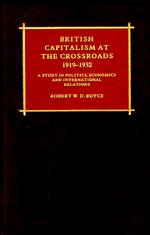 British Capitalism at the Crossroads, 1919–1932
British Capitalism at the Crossroads, 1919–1932 Book contents
- Frontmatter
- Contents
- Preface
- List of abbreviations
- Introduction
- 1 THE POLITICS OF ECONOMIC INTERNATIONALISM
- 2 CRUCIFIED ON A CROSS OF GOLD
- 3 ‘NORMALCY’
- 4 CONFLICT OVER COMMERCE
- 5 THE SCRAMBLE FOR GOLD
- 6 THE SECOND LABOUR GOVERNMENT AT THE HAGUE
- 7 FREE TRADE: THE LAST OFFENSIVE
- 8 THE CHALLENGE OF REGIONALISM
- 9 THE GOLD STANDARD UNDERMINED
- 10 THE AUSTRO-GERMAN CUSTOMS UNION CRISIS
- 11 THE COLLAPSE OF ECONOMIC INTERNATIONALISM
- Conclusion
- Notes
- Bibliography
- Index
9 - THE GOLD STANDARD UNDERMINED
Published online by Cambridge University Press: 05 November 2011
- Frontmatter
- Contents
- Preface
- List of abbreviations
- Introduction
- 1 THE POLITICS OF ECONOMIC INTERNATIONALISM
- 2 CRUCIFIED ON A CROSS OF GOLD
- 3 ‘NORMALCY’
- 4 CONFLICT OVER COMMERCE
- 5 THE SCRAMBLE FOR GOLD
- 6 THE SECOND LABOUR GOVERNMENT AT THE HAGUE
- 7 FREE TRADE: THE LAST OFFENSIVE
- 8 THE CHALLENGE OF REGIONALISM
- 9 THE GOLD STANDARD UNDERMINED
- 10 THE AUSTRO-GERMAN CUSTOMS UNION CRISIS
- 11 THE COLLAPSE OF ECONOMIC INTERNATIONALISM
- Conclusion
- Notes
- Bibliography
- Index
Summary
For most of the second Labour government's period in office, June 1929 to August 1931, controversy over the gold standard remained in the background. One reason was that the explosion of interest in the fiscal question dominated the political world to a degree unequalled since 1906. Another was Snowden's announcement of a full-scale inquiry into banking and finance as they related to industry. The problem was not thereby removed, however. Violent capital and gold movements continued to disrupt the exchanges, and deflationary pressure on the domestic economy became more acute than ever. Much of the resulting frustration went into demands for trade protection. But it also sustained – despite the enduring myth to the contrary – a seething dissatisfaction with the gold standard within the industrial community, and even among mercantile elements of the City, which threatened to erupt into uncontrollable opposition. It was not surprising that the years of the slump were also marked by intense activity within the financial community to allay public criticism of the gold standard, and to ease the deflationary strain on the domestic economy through reform of the international monetary system.
The Macmillan committee
Critics of the gold standard appreciated only too well that the findings of a committee of inquiry would have little to do with objective truth and a great deal to do with the composition of the committee.
- Type
- Chapter
- Information
- British Capitalism at the Crossroads, 1919–1932A Study in Politics, Economics, and International Relations, pp. 280 - 305Publisher: Cambridge University PressPrint publication year: 1988


